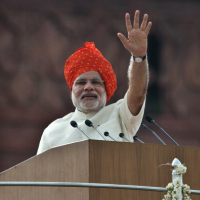Bank Accounts, Gender Injustice and Toilets: Modi Wants India to Step Up
 Prime Minister Narendra Modi after his maiden Independence Day speech (photo: AFP/Getty Images)
Prime Minister Narendra Modi after his maiden Independence Day speech (photo: AFP/Getty Images)
Prime Minister Narendra Modi used the occasion of Independence Day to make a powerful speech, calling on fellow Indians to help him fight a war on poverty, on gender injustice and on unsanitary conditions. These may not have been the ‘big bang’ economic reforms some analysts were expecting, but the social objectives he outlined are important nonetheless.
The venue was the iconic 17th century Red Fort, a World Heritage Site, where the country’s prime minister makes a speech every August 15. This year stood out for several reasons:
- 10,000 common folk were allowed to gather to hear Modi speak, while on earlier occasions only officials and school children were allowed to witness the speech.
- Modi spoke extempore for 65 minutes, hardly glancing at his notes, a welcome departure from his mild-mannered predecessor Dr. Manmohan Singh, whose read out speeches were largely ignored.
- Modi addressed the crowd without a bulletproof screen in front, another change from previous years when the security barrier had seemed to alienate the audience
- and while previous prime ministers usually took the opportunity to lambast Pakistan, Modi told India to put its own social house in order and called on the neighbouring countries to join in the war on poverty.
In particular, Modi attacked the unsanitary practice of defecating in the open. Fewer than half of India's population use toilets, and Modi said the government was targeting sanitation for all within 10 years.
“I don’t know if people will appreciate my talking about dirt and toilets from the Red Fort but I come from a poor family. I have seen poverty and the attempt to give dignity to the poor starts from there,” the prime minister said.
Modi also announced a scheme to open bank accounts for all Indian households, and announced another to teach people technical and entrepreneurial skills so that they could find jobs.
India needed manufacturing investment and the training of its workforce, Modi said.
“I want to tell the world, ‘come, make in India’,” he declared. “We have the skills, we have the strength, we have the people.”
He also announced the abolition of the Planning Commission that has guided the economy for 64 years. Set up by India’s first PM Jawaharlal Nehru to provide Soviet-style Five Year Plans, it had outlived its usefulness in an economy where local implementation is far more important than large centralised planning.
Modi is India’s first prime minister to be born after independence from Britain, and his maiden speech from the ramparts of the Red Fort was described by Indian political commentators as “inclusive”, “statesmanlike” and the words of “a moderniser”.
The challenge that now lies before Modi is implementation. He has raised the hopes and aspirations of his countrymen. The time has come to deliver.
- Top Stories
- Controversies
- Where is the Money Going?
- India and the World
- Appointments and Resignations
- Unusual News
- Latest News
- India College Chain’s Expansion into U.S. Draws Opposition from Massachusetts Officials over Quality of Education
- Milk Shortages in India Tied to Release of New Movies Featuring Nation’s Favorite Stars
- Confusion Swirls around Kashmir Newspaper Ban in Wake of Violent Street Protests
- Polio-Free for 5 Years, India Launches Vaccine Drive after Polio Strain Discovery
- New Aviation Policy Could Increase Service, Lower Ticket Prices






Comments